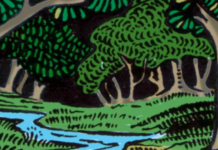
PsyberMagick: Advanced Ideas in Chaos Magic
, by Peter J. Carroll, illustrated by S. Jason Black
New Falcon Publications, 1561840920, 130 pp. (incl. further reading), 1995, 1998, 2000
‘In selecting beliefs we might as well try to go for maximum entertainment value and capability enhancement, regardless of the so-called ‘facts’; for if a human really wants something, statistics count for nothing.’1
And this represents the central theme of Psybermagick, which is essentially a collection of magickal maxims intended to compliment his two previous works Liber Null & Psychonaut
and Liber Kaos
. As a supplementary text, it further develops the ideas previous presented, and indeed the rituals and commentaries assume that the readers possess both previous works.
Psybermagick is predominantly compiled of brief notes on various subjects with a page or so of commentary, all in e-prime. Carroll covers subjects such as retroactive magick, magickal attack, politics; as well as introducing a few more magickal equations. Yes, Carroll is still playing around with physics, trying to find a mathematical justification for magick, which I find very unnecessary, distracting and, frankly, impractical.
In this work Carroll has adopted the multiple selves paradigm (or multiple selfs as he terms it). even offering an apology ‘in advance for any irritation and confusion caused by the use of standard Chaotic grammar which avoids all concepts of ‘being’, and uses ‘we’ instead of ‘I’, in recognition of the legionary nature of the personal multimind’.2
Carroll does devise an interesting political system called ‘Chaocracy’, operating on the principle of selecting a legislative body ‘purely by random means’, stating that ‘a chaocracy will free us from the conflict of party political ideology with conscience, and free us from the distasteful business of casting our votes amongst professional liars’. It could work, as he says ‘we trust people’s lives to randomly selected juries as the only fair method; should we use any less fair method for a nation or a planet?’
Much of the inspiration for this work is obviously drawn from Crowley as it is written in the style of Crowley’s Book of Lies, and Carroll’s newfound adoption of his spelling of ‘magick’. Though it is still typically infused with Carroll’s personal dogmas, he does demonstrate a unique sense of humour.
Ultimately witty and inspirational, this book will likely find a favoured place on any chaote’s bookshelf.








